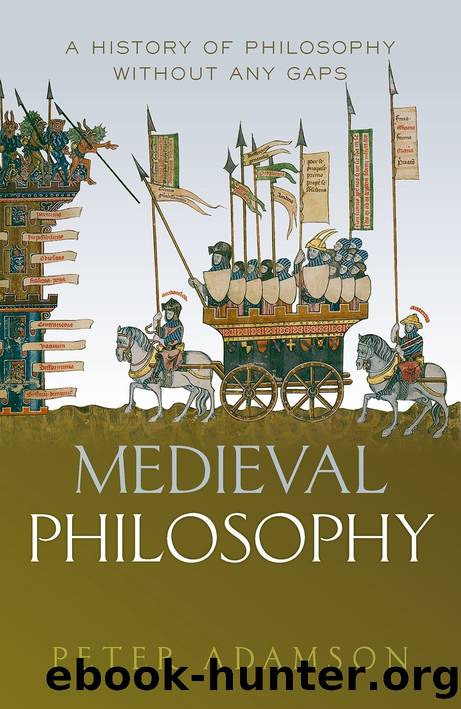Medieval Philosophy (A History of Philosophy) by Peter Adamson

Author:Peter Adamson [Adamson, Peter]
Language: eng
Format: epub
Publisher: OUP Oxford
Published: 2019-09-26T00:00:00+00:00
47
Here Comes the Son
The Trinity and the Eucharist
Lewis Carrollâs Through the Looking Glass contains a scene in which Alice, in discussion with the White Queen, says that she canât believe impossible things. The Queen responds, âI daresay you havenât had much practice. When I was your age, I always did it for half-an-hour a day. Why, sometimes Iâve believed as many as six impossible things before breakfast.â From which you might infer that the White Queen would have felt quite at home in the Middle Ages, and not just because she was royalty. Medieval philosophy is notoriously intertwined with Christian theology, and some Christian doctrines may seem to involve embracing the impossible. In modern times, philosophers have sometimes taken this to be a great virtue. The nineteenth-century Danish thinker Søren Kierkegaard put the notion of the âabsurdâ at the center of Christianity, arguing that we should not and indeed cannot rationally accept the idea of Godâs incarnation as a human. It can be believed only by faith.
The medievals were far more inclined to think that reason goes hand in hand with faith. By this stage Iâve hopefully managed to disabuse you of any notion that medieval thinkers spent all their time thinking of nothing but faith, ignoring the deliverances of natural reason. For that matter, when they did think about theology, they often took a highly rationalist approach. Now, though, weâre going to look at issues that posed a particularly stern test for that approach. We wonât live up to the example set by the White Queen; I for my part have already had breakfast, and we will be trying to wrap our minds around only two apparently impossible beliefs. These are the Trinity, the doctrine that God is one and simple, yet three Persons, Father, Son, and Holy Spirit, and the Eucharist, the doctrine that bread and wine can turn into the body and blood of Christ.1 However hard these things may be to believe, medieval thinkers insisted that they are not in fact impossible. Thomas Aquinas, Henry of Ghent, Duns Scotus, and others pushed reasoning to its limits in order to show that the Trinity and Eucharist are indeed possible and even to a large extent rationally comprehensible. This led them to investigate topics of more general interest like philosophy of mind, the metaphysical status of relations, and the connection between substances and their properties.
Of course, Christian thinkers had already been using philosophy to grapple with these matters for a long time. We saw that in the eleventh century a bitter dispute erupted in which Lanfranc of Bec attacked Berengar of Tours for holding that the Eucharist is merely symbolic in character, and that in the twelfth century Abelard and others convinced themselves that pagan philosophers like Plato had intuitively grasped the Trinity (Chapters 5 and 14). These discussions lived on in the memory of later medieval thinkers. Aquinas, for instance, refers to Berengarâs position as a heresy (ST 3 Q75 a1). But when it came to the Trinity, they took their cue above all from an even earlier author: Augustine.
Download
This site does not store any files on its server. We only index and link to content provided by other sites. Please contact the content providers to delete copyright contents if any and email us, we'll remove relevant links or contents immediately.
| Africa | Americas |
| Arctic & Antarctica | Asia |
| Australia & Oceania | Europe |
| Middle East | Russia |
| United States | World |
| Ancient Civilizations | Military |
| Historical Study & Educational Resources |
Magic and Divination in Early Islam by Emilie Savage-Smith;(1533)
Papillon by Henry Charrière(1432)
Bohemians, Bootleggers, Flappers, and Swells: The Best of Early Vanity Fair by Bohemians Bootleggers Flappers & Swells- The Best of Early Vanity Fair (epub)(1409)
Ambition and Desire: The Dangerous Life of Josephine Bonaparte by Kate Williams(1389)
Twelve Caesars by Mary Beard(1315)
What Really Happened: The Death of Hitler by Robert J. Hutchinson(1163)
Operation Vengeance: The Astonishing Aerial Ambush That Changed World War II by Dan Hampton(1162)
London in the Twentieth Century by Jerry White(1147)
The Japanese by Christopher Harding(1133)
Time of the Magicians by Wolfram Eilenberger(1126)
Twilight of the Gods by Ian W. Toll(1120)
Lenin: A Biography by Robert Service(1076)
The Devil You Know by Charles M. Blow(1024)
A Social History of the Media by Peter Burke & Peter Burke(976)
Freemasons for Dummies by Hodapp Christopher;(964)
Napolean Hill Collection by Napoleon Hill(943)
Henry III by David Carpenter;(919)
The Rise and Triumph of the Modern Self by Unknown(913)
Richard III (The English Monarchs Series) by Charles Ross(908)
